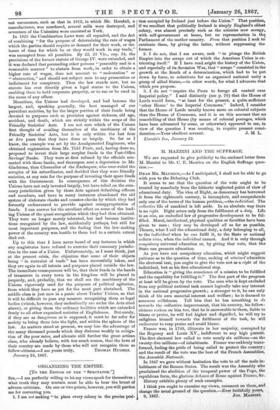M. MAZZINI AND THE SUFFRAGE.
We are requested to give publicity to the enclosed letter from M. Mazzini to Mr. C. E. Maurice on the English Suffrage ques- tion :—
DEAR MR. MAURICE,—As I anticipated, I shall not be able to go with you to the Debating Club.
It seems to me that the question of the vote ought to be treated by somebody from the hitherto lected point of vie* of educational duty. The idea of Right, as democracy has borrowed it from the eighteenth century, is incomplete, and comprehends only one of the terms of the human problem,—the individual. The collective life of mankind is left aside. In an absolute way there is no right. Right arises only from the fulfilment of a duty. Life is an aim, an embodied law of progressive development to be ful- filled. Moral, intellectual, physical qualities or faculties have been given to man ; they may be developed all as far as possible. Thence, what I call the educational duty, a duty belonging to all, to the individual when he can fulfil it, to the State or national collatm vires, when the individual cannot. And it is only through compulsory universal education or, by giving that vote, that the State can promote education.
As you have not compulsory education, which might suggest patience as to the question of time, making of attained education the electoral test, you ought to give the vote not as a right of the individual, but as his first educational step.
Education is " giving the conscience of a mission to be fulfilled and the capability for fulfilling it." The first part of the program at least will be given by the vote. The man who is kept excluded from any political national task cannot logically take any interest in the national progressive growth ; a stranger to it, he can only think of his own material interest and welfare ; he is doomed to sensuous selfishness. Tell him that he has something to do towards the collective improvement, that his country, his fellow- citizens reckon on him too, that he is answerable to them, liable to blame or praise, he will feel higher and dignified, he will try to enlighten himself towards the fulfilment of the task, he will endeavour to reap praise and avoid blame.
France was, in 1789, illiterate in her majority, corrupted by the Regency and Louis XV., indifferent to any high pursuit.
The first electoral law called to vote nearly six millions—on the twenty-five millions—of inhabitants. France was suddenly trans- formed, feeling the pride of being called to protect the country; and the result of the vote was the best of the French Assemblies, the Assemblee Nationale.
In 1847 we gave without hesitation the vote to all the male in- habitants of the Roman States. The result was the Assembly who proclaimed the abolition of the temporal power of the Pope, the republican form, the glorious defence of Rome against France, &c .
History exhibits plenty of such examples.
I think you ought to examine my views, comment on them, and change the usual ground of the question.—Ever faithfully yours,






























 Previous page
Previous page